二胎政策英语文献资料
- 格式:docx
- 大小:33.46 KB
- 文档页数:10
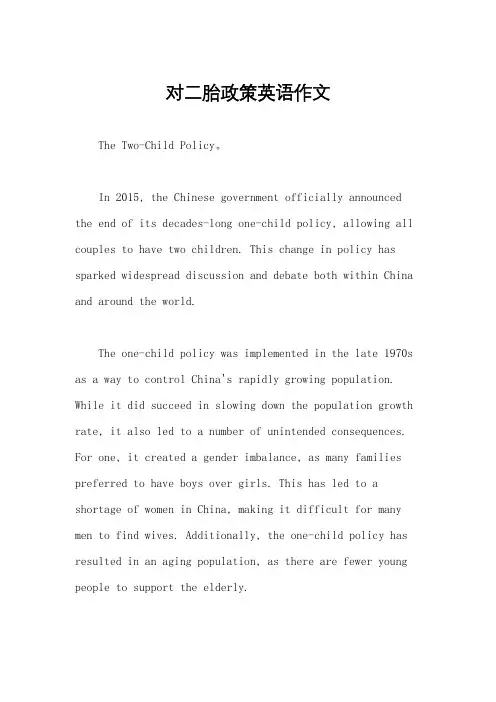
对二胎政策英语作文The Two-Child Policy。
In 2015, the Chinese government officially announced the end of its decades-long one-child policy, allowing all couples to have two children. This change in policy has sparked widespread discussion and debate both within China and around the world.The one-child policy was implemented in the late 1970s as a way to control China's rapidly growing population. While it did succeed in slowing down the population growth rate, it also led to a number of unintended consequences. For one, it created a gender imbalance, as many families preferred to have boys over girls. This has led to a shortage of women in China, making it difficult for many men to find wives. Additionally, the one-child policy has resulted in an aging population, as there are fewer young people to support the elderly.With the implementation of the two-child policy, many people are hopeful that these issues will be alleviated. For one, the gender imbalance may be corrected as families are now allowed to have two children, regardless of their gender. This could help to address the shortage of women in China and create a more balanced society. Additionally, the two-child policy may also help to address the issue of an aging population, as more young people will be available to support the elderly.However, there are also concerns about the impact of the two-child policy. Some worry that it may lead to overpopulation and put a strain on China's already limited resources. Others are concerned about the potential impact on the economy, as more children will require more resources and support. There are also questions about how the policy will be enforced and what measures will be taken to ensure that families are not pressured into having more children than they can afford.In conclusion, the implementation of the two-child policy in China has sparked both hope and concern. While itmay help to address some of the issues created by the one-child policy, there are also concerns about its potential impact on the country's resources and economy. It will be important for the Chinese government to carefully monitor the effects of the two-child policy and make adjustments as needed to ensure that it is successful in achieving its goals.。
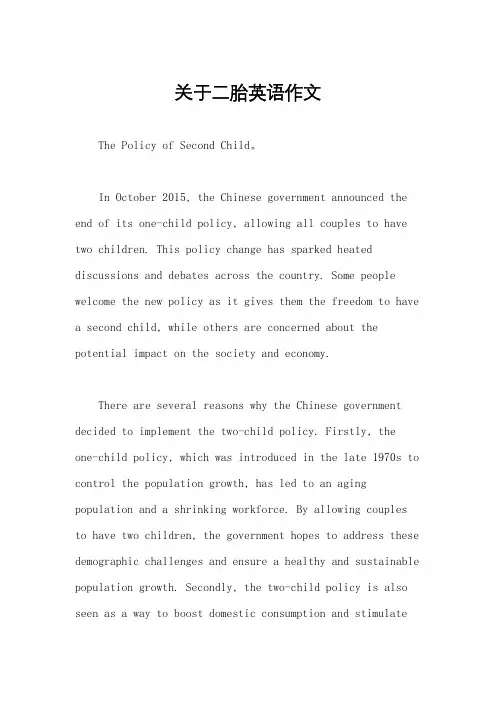
关于二胎英语作文The Policy of Second Child。
In October 2015, the Chinese government announced the end of its one-child policy, allowing all couples to have two children. This policy change has sparked heated discussions and debates across the country. Some people welcome the new policy as it gives them the freedom to have a second child, while others are concerned about the potential impact on the society and economy.There are several reasons why the Chinese government decided to implement the two-child policy. Firstly, theone-child policy, which was introduced in the late 1970s to control the population growth, has led to an aging population and a shrinking workforce. By allowing couples to have two children, the government hopes to address these demographic challenges and ensure a healthy and sustainable population growth. Secondly, the two-child policy is also seen as a way to boost domestic consumption and stimulateeconomic growth. With more children in the family, parents are likely to spend more on education, healthcare, and other goods and services, which will in turn drive the demand for consumer products and services.However, the implementation of the two-child policy has also raised concerns about its potential impact on the society and economy. One of the main concerns is the strain on the already overburdened public services, such as education, healthcare, and social welfare. With an increase in the number of children, the demand for these services is expected to surge, putting pressure on the government to provide adequate and affordable services to all citizens. Another concern is the potential gender imbalance, as some families may still prefer to have boys over girls, leading to a skewed sex ratio and social issues.In response to these concerns, the government has taken measures to address the challenges posed by the two-child policy. For example, it has increased investment in education and healthcare, expanded social welfare programs, and implemented measures to promote gender equality. Inaddition, the government has also introduced incentives, such as tax breaks and subsidies, to encourage couples to have more children and support their upbringing.In conclusion, the implementation of the two-child policy in China has both positive and negative implications for the society and economy. While it is expected to address the demographic challenges and stimulate economic growth, it also poses challenges in terms of public services and gender imbalance. It is crucial for the government to continue monitoring the impact of the policy and take proactive measures to address the challenges and ensure a sustainable and harmonious society.。
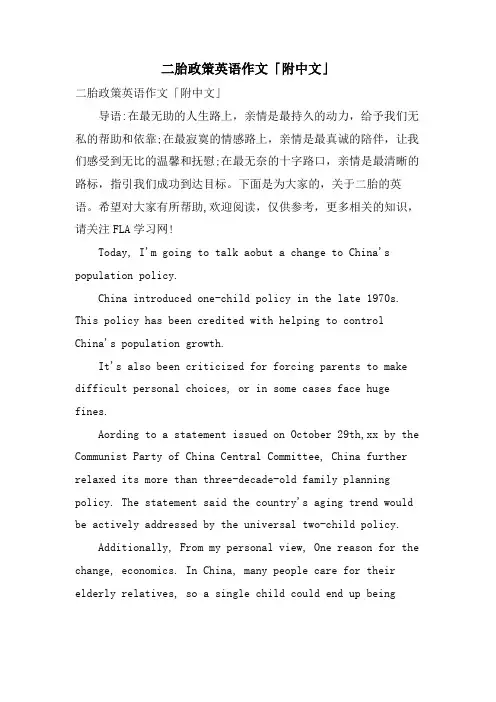
二胎政策英语作文「附中文」二胎政策英语作文「附中文」导语:在最无助的人生路上,亲情是最持久的动力,给予我们无私的帮助和依靠;在最寂寞的情感路上,亲情是最真诚的陪伴,让我们感受到无比的温馨和抚慰;在最无奈的十字路口,亲情是最清晰的路标,指引我们成功到达目标。
下面是为大家的,关于二胎的英语。
希望对大家有所帮助,欢迎阅读,仅供参考,更多相关的知识,请关注FLA学习网!Today, I'm going to talk aobut a change to China's population policy.China introduced one-child policy in the late 1970s. This policy has been credited with helping to control China's population growth.It's also been criticized for forcing parents to make difficult personal choices, or in some cases face huge fines.Aording to a statement issued on October 29th,xx by the Communist Party of China Central Committee, China further relaxed its more than three-decade-old family planning policy. The statement said the country's aging trend would be actively addressed by the universal two-child policy.Additionally, From my personal view, One reason for the change, economics. In China, many people care for their elderly relatives, so a single child could end up beingfinancially responsible for parents and grandparents. This new policy could help with that.Another reason, China wants to improve human rights by the universal two-child policy.今天我将来说一下中国的人口政策改革。
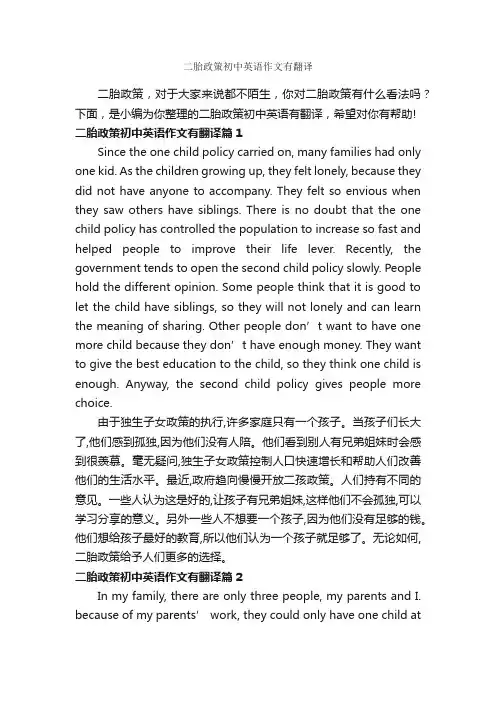
二胎政策初中英语作文有翻译二胎政策,对于大家来说都不陌生,你对二胎政策有什么看法吗?下面,是小编为你整理的二胎政策初中英语有翻译,希望对你有帮助! 二胎政策初中英语作文有翻译篇1Since the one child policy carried on, many families had only one kid. As the children growing up, they felt lonely, because they did not have anyone to accompany. They felt so envious when they saw others have siblings. There is no doubt that the one child policy has controlled the population to increase so fast and helped people to improve their life lever. Recently, the government tends to open the second child policy slowly. People hold the different opinion. Some people think that it is good to let the child have siblings, so they will not lonely and can learn the meaning of sharing. Other peop le don’t want to have one more child because they don’t have enough money. They want to give the best education to the child, so they think one child is enough. Anyway, the second child policy gives people more choice.由于独生子女政策的执行,许多家庭只有一个孩子。
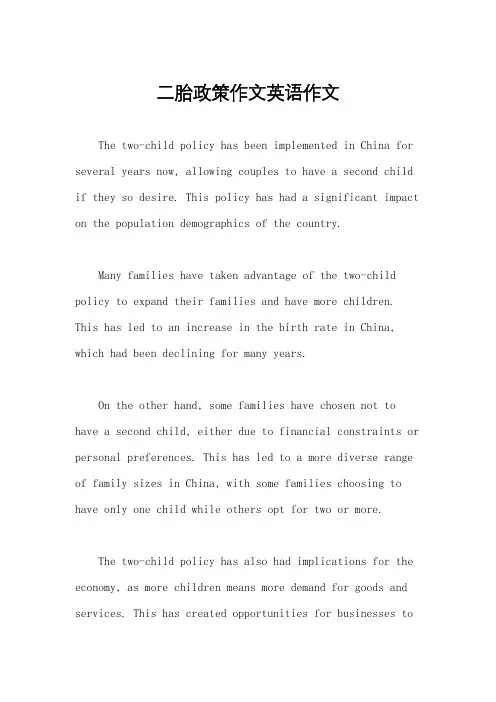
二胎政策作文英语作文The two-child policy has been implemented in China for several years now, allowing couples to have a second child if they so desire. This policy has had a significant impact on the population demographics of the country.Many families have taken advantage of the two-child policy to expand their families and have more children. This has led to an increase in the birth rate in China, which had been declining for many years.On the other hand, some families have chosen not to have a second child, either due to financial constraints or personal preferences. This has led to a more diverse range of family sizes in China, with some families choosing to have only one child while others opt for two or more.The two-child policy has also had implications for the economy, as more children means more demand for goods and services. This has created opportunities for businesses tocater to the needs of larger families, leading to economic growth in certain sectors.However, the two-child policy has also raised concerns about overpopulation and strain on resources. Some experts worry that an increase in the birth rate could lead to shortages of food, water, and other essential resources in the future.Overall, the two-child policy in China has had both positive and negative effects on society. It has allowed families more freedom in deciding how many children to have, but it has also raised concerns about the long-term sustainability of the population growth.。
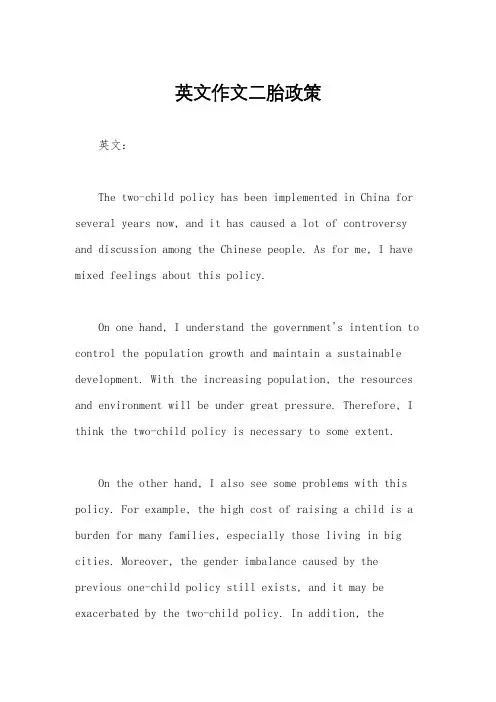
英文作文二胎政策英文:The two-child policy has been implemented in China for several years now, and it has caused a lot of controversy and discussion among the Chinese people. As for me, I have mixed feelings about this policy.On one hand, I understand the government's intention to control the population growth and maintain a sustainable development. With the increasing population, the resources and environment will be under great pressure. Therefore, I think the two-child policy is necessary to some extent.On the other hand, I also see some problems with this policy. For example, the high cost of raising a child is a burden for many families, especially those living in big cities. Moreover, the gender imbalance caused by the previous one-child policy still exists, and it may be exacerbated by the two-child policy. In addition, thepolicy may also lead to some social problems, such as the aging of the population and the decrease of the workforce.In my opinion, the two-child policy should be adjusted based on the actual situation. For example, the government could provide more support and incentives for families who choose to have a second child, such as tax breaks, education subsidies, and medical care. At the same time, the government should also take measures to address the problems caused by the policy, such as promoting gender equality and improving the social security system.Overall, I believe that the two-child policy has both positive and negative effects, and it requires further improvement and adjustment to achieve a better outcome.中文:中国的二孩政策已经实施了几年,引起了很多争议和讨论。
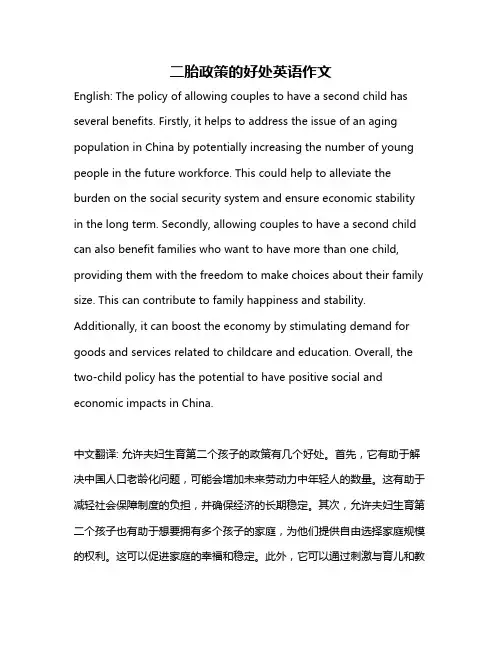
二胎政策的好处英语作文English: The policy of allowing couples to have a second child has several benefits. Firstly, it helps to address the issue of an aging population in China by potentially increasing the number of young people in the future workforce. This could help to alleviate the burden on the social security system and ensure economic stability in the long term. Secondly, allowing couples to have a second child can also benefit families who want to have more than one child, providing them with the freedom to make choices about their family size. This can contribute to family happiness and stability. Additionally, it can boost the economy by stimulating demand for goods and services related to childcare and education. Overall, the two-child policy has the potential to have positive social and economic impacts in China.中文翻译: 允许夫妇生育第二个孩子的政策有几个好处。

二孩政策利弊英语作文Introduction:The two-child policy, introduced in China in 2016, has been a topic of significant debate. This policy allows each couple to have two children, a shift from the previous one-child policy that was in place for several decades. As with any social policy, it has its advantages and disadvantages that affect the society, economy, and the individuals involved.Pros:1. Aging Population: One of the primary benefits of the two-child policy is that it addresses the issue of an aging population. With a growing number of retirees and a shrinking workforce, the policy aims to balance the demographic structure.2. Economic Growth: A larger working-age population can contribute to economic growth by increasing the labor force, which in turn can lead to higher productivity and innovation.3. Family Dynamics: Allowing families to have two children can lead to a more balanced family dynamic, with siblings providing companionship and support for each other.4. Gender Balance: The policy has the potential to reduce gender imbalance, as it reduces the pressure to have a male heir, which was a significant issue under the one-child policy.Cons:1. Population Pressure: Despite the need to address an aging population, increasing the birth rate can also lead to population pressure, straining resources and infrastructure.2. Economic Burden: While more workers can boost the economy, the immediate effect is an increased demand for resources such as education, healthcare, and housing for the growing number of children.3. Environmental Impact: A higher population can exacerbate environmental issues, including pollution and resource depletion, which are already significant challenges.4. Social Inequality: There is a risk that the policy may disproportionately benefit wealthier families who can afford to raise more children, potentially widening the social and economic gap.Conclusion:The two-child policy represents a significant shift in population management with both positive and negative implications. While it promises to invigorate the economy and address demographic challenges, it also poses risks to social equity and environmental sustainability. It is crucial for policymakers to carefully consider these factors and implement supporting measures to ensure a balanced and sustainable outcome.。
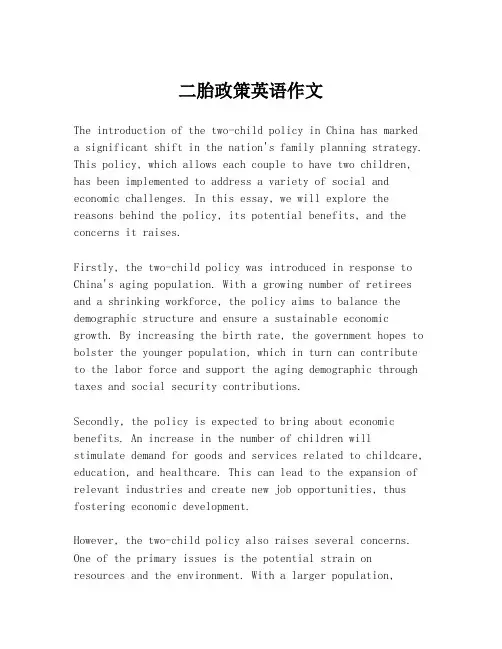
二胎政策英语作文The introduction of the two-child policy in China has marked a significant shift in the nation's family planning strategy. This policy, which allows each couple to have two children, has been implemented to address a variety of social and economic challenges. In this essay, we will explore the reasons behind the policy, its potential benefits, and the concerns it raises.Firstly, the two-child policy was introduced in response to China's aging population. With a growing number of retirees and a shrinking workforce, the policy aims to balance the demographic structure and ensure a sustainable economic growth. By increasing the birth rate, the government hopes to bolster the younger population, which in turn can contribute to the labor force and support the aging demographic through taxes and social security contributions.Secondly, the policy is expected to bring about economic benefits. An increase in the number of children will stimulate demand for goods and services related to childcare, education, and healthcare. This can lead to the expansion of relevant industries and create new job opportunities, thus fostering economic development.However, the two-child policy also raises several concerns. One of the primary issues is the potential strain on resources and the environment. With a larger population,there is an increased demand for food, water, and energy, which could exacerbate existing resource scarcity and environmental degradation.Additionally, the policy may not necessarily lead to the desired increase in birth rates. Many young couples in urban areas are deterred by the high cost of living and the expenses associated with raising children. As a result, some may choose to have only one child or none at all, despite the policy's allowance.In conclusion, the two-child policy in China is a strategic move to address the challenges of an aging population and to stimulate economic growth. While it holds the promise of positive outcomes, it is also crucial to consider the potential environmental and social implications. It will be interesting to observe how the policy unfolds and what measures will be taken to mitigate any negative effects.。
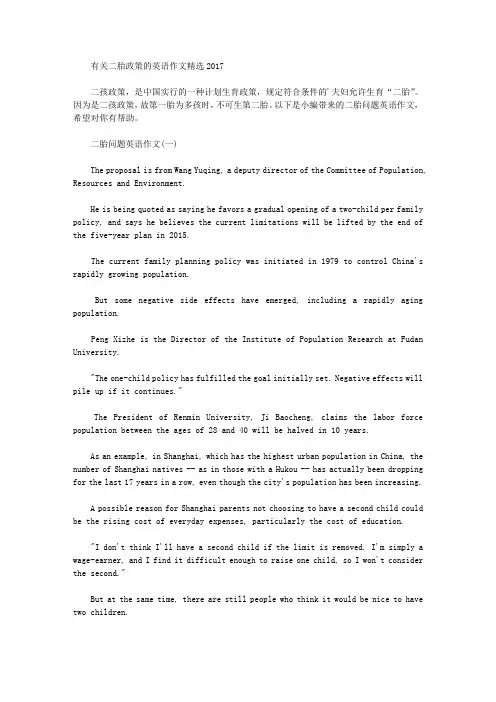
有关二胎政策的英语作文精选2017二孩政策,是中国实行的一种计划生育政策,规定符合条件的'夫妇允许生育“二胎”。
因为是二孩政策,故第一胎为多孩时,不可生第二胎。
以下是小编带来的二胎问题英语作文,希望对你有帮助。
二胎问题英语作文(一)The proposal is from Wang Yuqing, a deputy director of the Committee of Population, Resources and Environment.He is being quoted as saying he favors a gradual opening of a two-child per family policy, and says he believes the current limitations will be lifted by the end of the five-year plan in 2015.The current family planning policy was initiated in 1979 to control China's rapidly growing population.But some negative side effects have emerged, including a rapidly aging population.Peng Xizhe is the Director of the Institute of Population Research at Fudan University."The one-child policy has fulfilled the goal initially set. Negative effects will pile up if it continues."The President of Renmin University, Ji Baocheng, claims the labor force population between the ages of 28 and 40 will be halved in 10 years.As an example, in Shanghai, which has the highest urban population in China, the number of Shanghai natives -- as in those with a Hukou -- has actually been dropping for the last 17 years in a row, even though the city's population has been increasing.A possible reason for Shanghai parents not choosing to have a second child could be the rising cost of everyday expenses, particularly the cost of education."I don't think I'll have a second child if the limit is removed. I'm simply a wage-earner, and I find it difficult enough to raise one child, so I won't consider the second."But at the same time, there are still people who think it would be nice to have two children."I will think about it. A lot of parents now are the only child in families, to have two kids means they can look after each other in the future, and of course, there'll be financial burden."One-Child Policy has been relaxed in certain ways over the years.In cities such as Shanghai and Beijing, if a couple is both the product of the one-child policy, they're allowed to have two kids.Certian ethnic minority groups have been exempt from the rules entirely.And families in rural areas whose first child is a girl are also allowed to have a second child without punishment.It remains unclear as to how the proposed two-child policy will work, though it's being suggested that several big cities will be selected to try it before it's brought in around the country.For CRI, I'm Wang Jing.二胎问题英语作文(二)More than half of Beijing's adult single children don't intend to have two kids, even though national policy allows them to do so.The country's family planning policy of the late 1970s restricted urban families from having more than one child to control population growth.However, a new survey by the Beijing Administrative Institute shows 52 percent of those now-grown-up single children, who are allowed two offspring, do not want a second child.Many cited economic pressures as a factor.The results were released on Sunday at the Beijing Forum, organized by Peking University.Beijing has roughly 2 million only-child adults.More than 1,100 people from only-child families, aging 20 to 34, were polled.Only 24 percent of respondents said they would like to have two children.More than a quarter of respondents would opt for a "DINK" (double income, no kids)lifestyle.Survey figures showed that respondents with a primary education wanted 1.1 children on average, those with a bachelor degree wanted 1.3, and those with masters or higher degrees wanted 1.5 children."Beijing has maintained a super low birth rate - less than 1.3 children in a family in average - for nearly 20 years, posing increasing pressure on the country's aging population," Hou Yafei, a professor with the institute, said.Hou said that the top four factors that determined people's intentions to have children were "income, child care, housing and policy conditions"."The government should encourage couples from one-child families to have a second child and should provide better welfare services."This would promote population sustainability, Hou said.The survey also found that people with higher education backgrounds intend to have more children because they are more confident with their financial security.。
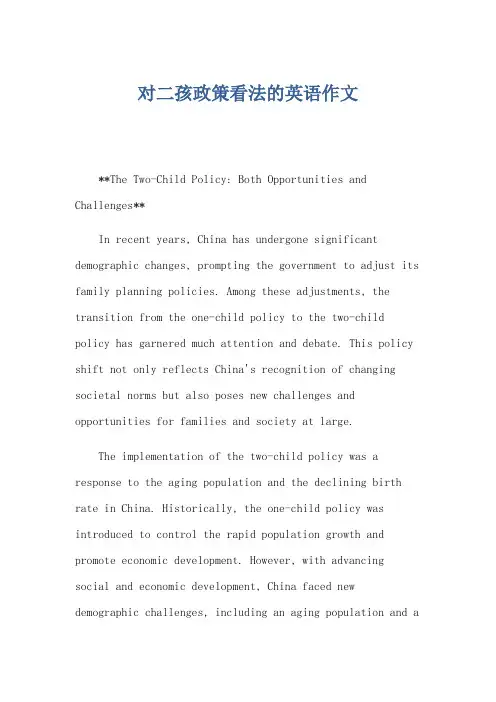
对二孩政策看法的英语作文**The Two-Child Policy: Both Opportunities and Challenges**In recent years, China has undergone significant demographic changes, prompting the government to adjust its family planning policies. Among these adjustments, the transition from the one-child policy to the two-childpolicy has garnered much attention and debate. This policy shift not only reflects China's recognition of changing societal norms but also poses new challenges and opportunities for families and society at large.The implementation of the two-child policy was a response to the aging population and the declining birth rate in China. Historically, the one-child policy was introduced to control the rapid population growth and promote economic development. However, with advancingsocial and economic development, China faced new demographic challenges, including an aging population and adeclining labor force. The two-child policy was designed to address these issues by allowing families to have two children, thus increasing the birth rate and mitigating the aging population problem.One of the significant benefits of the two-child policy is the potential to enhance family happiness and social harmony. Having two children can provide parents with more joy and fulfillment, as they can enjoy the companionship and growth of two children. Additionally, it can strengthen family bonds and increase social interaction, promoting a more vibrant and diverse society.Moreover, the two-child policy can contribute to economic growth and development. A larger labor force can boost economic productivity and competitiveness. Additionally, the increase in the number of children can stimulate demand for consumer goods and services, thus driving economic growth.However, the implementation of the two-child policy also poses some challenges. Firstly, it can increase the financial and emotional burden on families. Raising two children requires more resources and attention, which canbe a significant challenge for many families. Secondly, the policy can exacerbate the already existing educational and healthcare challenges in China. With more children, the demand for quality education and healthcare services will increase, putting pressure on the existing infrastructure and resources.Additionally, the transition from the one-child policy to the two-child policy requires significant cultural and societal adjustments. The one-child policy had been a central part of Chinese society for decades, and its abolition has led to a need for societal reorientation and cultural adaptation. This transition can be challenging, especially for older generations who are accustomed to the one-child norm.In conclusion, the two-child policy represents both an opportunity and a challenge for China. It offers the potential to address demographic challenges, enhance family happiness, and promote economic growth. However, it also poses financial, educational, healthcare, and cultural challenges that need to be addressed effectively. To maximize the benefits of this policy, it is essential toinvest in education, healthcare, and social welfare systems to ensure that families have the necessary support and resources to raise their children well.**二孩政策:机遇与挑战并存**近年来,中国经历了显著的人口变化,促使政府调整其计划生育政策。
二胎政策的影响The implementation of the two-child policy in China has had significant implications on various aspects of society, economy, and culture. This policy, which allowed families to have two children instead of the previous one-child limit, was introduced in response to changing demographic trends and societal needs.Demographically, the two-child policy has contributed to the stabilization and eventual growth of China's population. The policy helped to alleviate concerns about an aging population and a shrinking workforce, which could have had negative impacts on economic development. The increase in the number of births has also led to a more balanced gender ratio, as families were no longer constrained by the one-child limit and were able to have children of both genders.Economically, the two-child policy has generated new opportunities and challenges. On the one hand, the policy has boosted consumer demand, particularly in the areas of baby products, healthcare, and education. This has led to the creation of new jobs and the expansion of relatedindustries. On the other hand, the policy has also put pressure on public services and infrastructure, such as hospitals and schools, which need to accommodate the increasing number of children.Culturally, the two-child policy has had a profound impact on family structures and values. Families now have more flexibility in planning their families, and many parents are embracing the idea of having two children to provide companionship and mutual support for their offspring. This shift has also led to changes in societal norms and expectations about family size and roles.However, the implementation of the two-child policy has not been without its challenges. Some families have struggled to balance the financial and emotional demands of raising two children, while others have faced difficulties in accessing quality healthcare and education services. The policy has also led to concerns about environmental sustainability, as the increasing population puts pressure on natural resources and the environment.In conclusion, the two-child policy in China has had a significant impact on various aspects of society. While ithas contributed to population stabilization and economic growth, it has also presented new challenges and opportunities. It remains to be seen how China willcontinue to address these challenges and harness the potential benefits of the policy in the future.**二胎政策的影响**中国二胎政策的实施,对社会的多个方面——包括社会、经济和文化——产生了显著的影响。
二胎政策的影响英语作文The Impact of the Two-Child PolicyThe implementation of the two-child policy in China has brought about significant changes to society and the economy. This policy, aimed at addressing demographic challenges, has had both positive and negative impacts.Positive Impacts:1.Alleviating Population Aging Pressure: With the rise in life expectancy andthe decline in birth rates, China was facing a rapidly aging population. Thetwo-child policy helps to mitigate this trend by increasing the birth rate andbringing more young people into the population mix.2.Addressing Labor Shortages: As the working-age population declines, thetwo-child policy can help replenish the labor force in the long run. This iscrucial for sustaining economic growth and maintaining social welfaresystems.3.Stimulating Economic Growth: The policy has the potential to boostconsumer spending, particularly in sectors related to children's goods andservices. This includes industries like baby products, toys, clothing, andeducation, which can expect an increase in demand.Negative Impacts:1.Population Imbalance: There is a concern that the two-child policy mayexacerbate gender imbalances, as some families may prefer to have a son due to cultural and societal pressures. This could lead to a skewed sex ratio in the future.2.Quality of Life Challenges: With an increase in the number of children,families may face additional financial and emotional burdens. This couldpotentially affect the quality of life for both parents and children.3.Strain on Resources: A higher birth rate could lead to increased demand forresources such as education, healthcare, and housing. Without adequateplanning and investment, this could result in strain on existing infrastructure and services.In conclusion, the two-child policy has had a profound impact on Chinese society and the economy. While it addresses some demographic challenges, it also poses new challenges that need to be carefully managed.。
二胎政策作文英语The Two-Child Policy。
In recent years, the Chinese government has implemented a new policy called the Two-Child Policy, which allows couples to have two children instead of one. This policy has been met with mixed reactions from the public, and it has sparked a heated debate on the pros and cons of having a second child. In this essay, we will explore the reasons behind the implementation of the Two-Child Policy, as well as its potential impacts on society.The Two-Child Policy was introduced in 2015 as a response to the country's aging population and declining birth rate. China's one-child policy, which was in placefor over three decades, had led to a significant gender imbalance and an aging population. The government recognized the need to address these issues and decided to relax the family planning policy to allow couples to have two children. This move was seen as a way to boost thecountry's labor force, stimulate economic growth, and support the elderly population.One of the main benefits of the Two-Child Policy isthat it gives couples more freedom and flexibility in planning their families. Under the one-child policy, many couples faced pressure to have only one child, which led to issues such as gender imbalance and a shrinking workforce. With the new policy in place, couples now have the option to have a second child if they so desire. This has been welcomed by many families who have longed for a larger family size and the opportunity to have siblings for their children.Furthermore, the Two-Child Policy is expected to have a positive impact on the economy. By increasing the size of the labor force, the policy can help address labor shortages and support economic growth. In addition, the increased demand for goods and services from a larger population can stimulate consumption and drive economic development. This can potentially lead to a more dynamic and competitive economy, which can benefit the country as awhole.However, the Two-Child Policy also has its critics, who argue that it may lead to overpopulation and strain the country's already limited resources. China is already the most populous country in the world, and some fear that allowing couples to have two children will exacerbate the problem. Overpopulation can put pressure on the environment, lead to resource scarcity, and contribute to social and economic challenges. Critics also point out that the policy may not be effective in addressing the country's demographic challenges and could potentially create new problems in the future.In conclusion, the Two-Child Policy is a significant change in China's family planning policy, and it has the potential to have far-reaching impacts on the country's society and economy. While the policy has its benefits in terms of giving couples more freedom and supporting economic growth, it also raises concerns about overpopulation and resource constraints. It is importantfor the government to carefully monitor the implementationof the policy and make adjustments as needed to ensure that it achieves its intended goals while mitigating any negative consequences. Ultimately, the success of the Two-Child Policy will depend on how it is managed and the extent to which it can strike a balance between promoting family values and addressing demographic challenges.。
二胎政策的英语作文The Two-Child Policy, officially announced in 2016, marked a significant shift in China's family planning regulations. This policy allows each couple to have two children, a change from the previous One-Child Policy that had been in place for several decades. The introduction of the Two-Child Policy has had profound implications on various aspects of Chinese society, including demographics, economy, and culture.Demographically, the policy aims to address the aging population issue in China. With a growing number of retirees and a shrinking workforce, the country faced potential economic challenges. By allowing families to have a second child, the policy is expected to increase the birth rate, which in turn will contribute to a larger and more sustainable working-age population in the future.Economically, the Two-Child Policy is anticipated to stimulate growth in various sectors. The increase in the number of children is likely to lead to higher demand for goods and services such as education, healthcare, and child-related products. This could create new businessopportunities and potentially boost consumption, which is a key driver of China's economy.Culturally, the policy may also have a significant impact on family dynamics and societal values. Traditionally, the One-Child Policy has led to a generation of only children whooften became the center of their family's attention. With the Two-Child Policy, there is a possibility of a shift in family structures and the way children are raised, potentially fostering a more collaborative and less individualistic approach to upbringing.However, the Two-Child Policy also faces challenges. Not all families are willing or able to have a second child due to financial constraints, career considerations, or personal preferences. Additionally, the policy must be accompanied by supportive measures such as affordable childcare and parental leave to ensure that the benefits are accessible to all segments of society.In conclusion, China's Two-Child Policy represents a major step towards balancing the population and promoting economic and social development. While it presents both opportunities and challenges, its long-term effects on the country's demographics and economy will be closely monitored and analyzed in the coming years.。
关于二胎政策的英语作文The Two-Child Policy in China。
In 2015, the Chinese government officially announced the end of the one-child policy and introduced the two-child policy, allowing all couples to have two children. This policy change was a significant shift in China's population control measures and has brought about various social, economic, and cultural implications.The one-child policy was implemented in the late 1970s to curb the rapid population growth in China. While it was successful in controlling the population, it also led to a skewed gender ratio, an aging population, and a shrinking workforce. In response to these challenges, the government decided to relax the policy and allow couples to have two children.The implementation of the two-child policy has had a profound impact on Chinese society. Firstly, it has led toan increase in the birth rate, with many couples choosing to have a second child. This has resulted in a significant demographic shift, with the population becoming younger and more balanced in terms of gender ratio.Secondly, the two-child policy has had economic implications. With more couples choosing to have two children, there has been an increased demand for childcare services, educational resources, and healthcare facilities. This has created opportunities for businesses in these sectors and has contributed to economic growth.Furthermore, the two-child policy has had cultural implications. In the past, the one-child policy had led to a preference for male children, as they were seen as the ones to carry on the family name and provide for their parents in old age. With the introduction of the two-child policy, there has been a shift in attitudes towards gender equality and the value of daughters. This has had apositive impact on gender relations and family dynamics in Chinese society.However, the two-child policy has also brought about challenges. One of the main challenges is the strain on public resources, such as education and healthcare. With the increase in the number of children, there is a need for more schools, teachers, and medical facilities to accommodate the growing population. This has put pressure on the government to invest in these areas and ensure that there are enough resources to meet the needs of the population.Another challenge is the impact on the environment. With a larger population, there is an increased demand for natural resources, such as water, food, and energy. This has raised concerns about the sustainability of China's development and the need to balance economic growth with environmental conservation.In conclusion, the two-child policy in China has hadfar-reaching implications for the country. It has led to changes in demographics, economics, and culture, and has presented both opportunities and challenges for the government and society. As China continues to navigate theeffects of this policy change, it will be important to address the challenges and ensure that the benefits are maximized for the well-being of the population.。
关于二胎政策的英语作文(带翻译)China is a great country with the largest population in the world. In order to solve the population problem, our government decides to implemented one-child policy. When it is carried out for some time, many people not only see its advantages but also disadvantages. Thus, people argue that two-child policy should be put into effect. In my opinion, two-child policy should be carried out.中国是一个人口大国。
为了解决人口问题,我国政府决定实施独生子女政策。
执行一段时间后,许多人不仅看到了这个政策的优点还有缺点。
因此,人们开始推崇二胎政策。
在我看来,二胎政策是应该实施的。
作文First of all, two-child policy is the gift for some only child. For some families, maybe the parents are only child and they also can have only child. Put aside the loneliness of their child, when their child grows up and they grow older, their child marry with an only child girl accidentally, the burden on their child and his wife is unimaginable heavy. Their child and his wife have to take care of two old couples. Usually, a youngcouple looking after an old couple is a little difficult; if the pressure increasing twice, how can they stand it. But if their parents have two children, they can share the burden of taking care of their parents. It would be much better.首先,二胎政策对于一些独生子女来说是天赐的礼物。
debate topic: is the Two Child Policy necessary?China is a great country with the largest population in the world. In order to solve the population problem, our government decides to implemented one-child policy. When it is carried out for some time, many people not only see its advantages but also disadvantages. Thus, people argue that two-child policy should be put into effect. In my opinion, two-child policy should be carried out.中国是一个人口大国。
为了解决人口问题,我国政府决定实施独生子女政策。
执行一段时间后,许多人不仅看到了这个政策的优点还有缺点。
因此,人们开始推崇二胎政策。
在我看来,二胎政策是应该实施的。
First of all, two-child policy is the gift for some only child. For some families, maybe the parents are only child and they also can have only child. Put aside the loneliness of their child, when their child grows up and they grow older, their child marry with an only child girl accidentally, the burden on their child and his wife is unimaginable heavy. Their child and his wife have to take care of two old couples. Usually, a young couple looking after an old couple is a little difficult; if the pressure increasing twice, how can they stand it. But if their parents have two children, they can share the burden of taking care of their parents. It would be much better.首先,二胎政策对于一些独生子女来说是天赐的礼物。
对于一些家庭来说,也许父母都是独生子女,而他们也只生一个孩子。
抛开孩子的孤独不说,当他们的孩子长大了,而他们也变老了,他们的孩子又和一个独生子女结婚,这样的话,压在他们孩子和孩子妻子肩上的压力是不可想象的。
他们的孩子和他的妻子不得不照顾两对老人。
通常,一对年轻的夫妇照顾一对老人就有点难了;如果压力增加了一倍,他们怎么能忍受呢。
但是如果他们的父母有两个孩子,他们就能分享照顾父母的压力。
这样会比较好。
Secondly, two-child policy can guarantee the number of Chinese population. As the widely spread of one-child policy, some people have changed their conception about giving birth. If they firmly believe one-child policy, there will be more and more the dink. After several decades, our country will famous for lack of population.其次,二胎政策可以确保中国的人口数量。
由于广泛宣传独生子女政策,有些人已经改变了他们的生育观念。
如果他们认同独生子女政策,就会有越老越多的丁克族。
几十年后,我国就会以人口短缺而著名了。
In conclusion, one-child policy has out of date. And tow-child policy is needed and necessary. It can solve the problem of nowadays and the future.总之,独生子女政策已经过时了。
二胎政策是必要和必须的。
这可以解决当前和未来的问题。
Proposals to change China's family planning policy were put forward during the recent sessions of the National People's Congress (NPC) and the Chinese People's Political Consultative Conference (CPPCC) by a number of NPC deputies and CPPCC members. China currently faces sharply decreasing input into its labor force, a rapidly growing ageing population and an imbalance in male and female births. The NPC deputies and CPPCC members suggested changing the current one-child policy to a policy of "encouraging thebirth of one child, allowing two children and forbidding three children."建议改变中国的计划生育政策,提出了在全国人民代表大会(全国人大)及中国人民政治协商会议(政协)的由一些人大代表和政协委员的近几届。
中国目前面临大幅减少投入的劳动力,迅速增长的人口老龄化以及在男,女婴的失衡。
人大代表和政协委员建议改变目前的一胎化政策,政策“鼓励一个孩子的出生,让两个孩子和禁止三个孩子。
”This proposal is widely supported by the public.NPC deputy He Youlin submitted a proposal during the NPC session to allow a couple to have two children, saying, "it's high time to change the current family planning policy," due to the occurrence of a number of new population-related problems, such as accelerated growth of the ageing population, mounting pension payments, and the recently appearing "shortage of migrant workers."全国人大代表赫优林人大会议期间提交了一份提案,允许一对夫妇生育两个孩子,他说,“它的高时间来改变目前的计划生育政策,”由于一些新的与人口有关的问题,发生这样的随着人口老龄化的加速发展,固定养老金支付,以及最近出现的“民工荒”。
All of the problems are partly related to the one-child policy and, in the long term, these factors may affect economic growth, the deputy argued.所有的问题都部分因为一胎化政策,从长远来看,这些因素可能会影响经济增长,副争论。
A country where people aged 60 or older account for more than 10 percent of the total population, or those aged 65 or older account for more than 7 percent of the total population, is defined as an ageing society. In an "ageing society," if the proportion is more than 14 percent, it is called an "aged society." China's 2000 census shows the country has already become an "ageing society." United Nations statistics indicate China will become an "aged society" in 2025.那里的人60岁以上占超过10%的总人口,即65岁以上的老年人占全国总人口的7%以上账龄的国家,被定义为老龄化社会。
在“老龄化社会”,如果该比例超过14%,这被称为“老龄社会”。
中国的2000年人口普查显示该国已经成为一个“老龄化社会”。
联合国统计资料显示,中国将成为2025年的“高龄社会”。
Can the problem of an ageing population be solved quickly if two babies are allowed to one couple? Is now a window period to adjust the current family planning policy? Should China continue its one-child policy?可以在人口老龄化的问题得以迅速解决,如果两个婴儿被允许一对夫妇?现在是一个窗口期,调整现行的计划生育政策?如果中国继续它的一胎化政策?Immediate suspensionWang Feng (): First, we must make clear the one-child policy is not directly responsible for the ageing society. Some people take it for granted the suspension of the one-child policy will immediately reverse China's ageing trend, but there are many reasons that help push up the proportion of the elderly in the whole population. To a certain extent, China's large ageing proportion is a result of a sharply decreasing birth rate during past decades. It means if we stop the one-child policy now, although we would not expect to see changes immediately, the population structure will improve in several decades. It will help relieve pressure from population ageing and even negative growth of the population. It is now therefore urgent to halt the one-child policy.首先,我们必须明确的一胎化政策是不直接负责的老龄化社会。